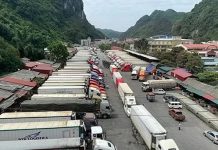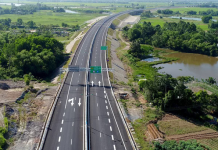
Amazing Race Vietnam has taken a lot of flak for having cement blocks placed on a coral reef in Phu Yen.
In its latest episode aired Saturday, the reality show asked contestants to dive underwater in the central province and place cement blocks in particular orders on coral reefs.
Completing this task would allow them to find clues to perform their next tasks.
However, the placing of cement blocks on coral reefs, several species of which are listed as endangered, was severely criticized on social media.
“I cannot believe… that people actually set up cement blocks and steel frames on the coral reefs,” said Ngoc Anh Tran, a former participant of the show, in a post on her Facebook page.
“Corals only grow a few centimeters a year; they are [part of] an underwater ecosystem which provides accommodation and food for other creatures… Even if the show’s organizers were not aware of the importance of corals, surely they could not be stupid enough to do such a damaging act to the coral reefs!” she added.
“I condemn the show’s producers for letting such a thing happen; it is a negative image, a negative message that is broadcast by a very popular TV show for young people,” she said, adding that the incident left her “hugely disappointed.”
In response to the backlash, the show’s Facebook fanpage published a post on Sunday, apologizing to viewers and to “the Phu Yen beach.”
The post said the show initially intended for the participants to swim through the coral reefs to reach an area of rocks and sand to find clues, before going back on land to perform their tasks. However, due to a change in water level and its clarity, the organizers decided to move the cement blocks from the rocks and sand area to the coral reefs for clearer footage.
Organizers of the show, which is broadcast on national television, said they have cooperated with third parties to clean up any trash after tasks are performed and warned participants to protect the environment.
“We would like to sincerely apologize to our viewers and the beach of Phu Yen… These things will not happen again,” the post said.
Worldwide, coral reefs have come under growing stress as a result of rising ocean temperatures caused by climate change and other human-induced pressures including overfishing, pollution and tourism.
Coral reefs in shallow waters are among the ecosystems most threatened by climate change and are a key barometer of global warming impacts, scientists say.
“Corals are particularly vulnerable due to the warming of the oceans, rising sea levels, and coral bleaching,” a Reuters report quoted Erick Castro, deputy head of Coralina’s sea and coast division, as saying last November.
Coral bleaching – a whitening driven by temperature changes or other stresses – can kill coral if it is severe enough. Corals are also at risk as oceans become more acidic as they absorb increasing amounts of carbon dioxide in the atmosphere.
Globally, about half a billion people rely on corals for food or to make a living – or for coastal defense, according to the U.S. National Oceanic and Atmospheric Administration.

























